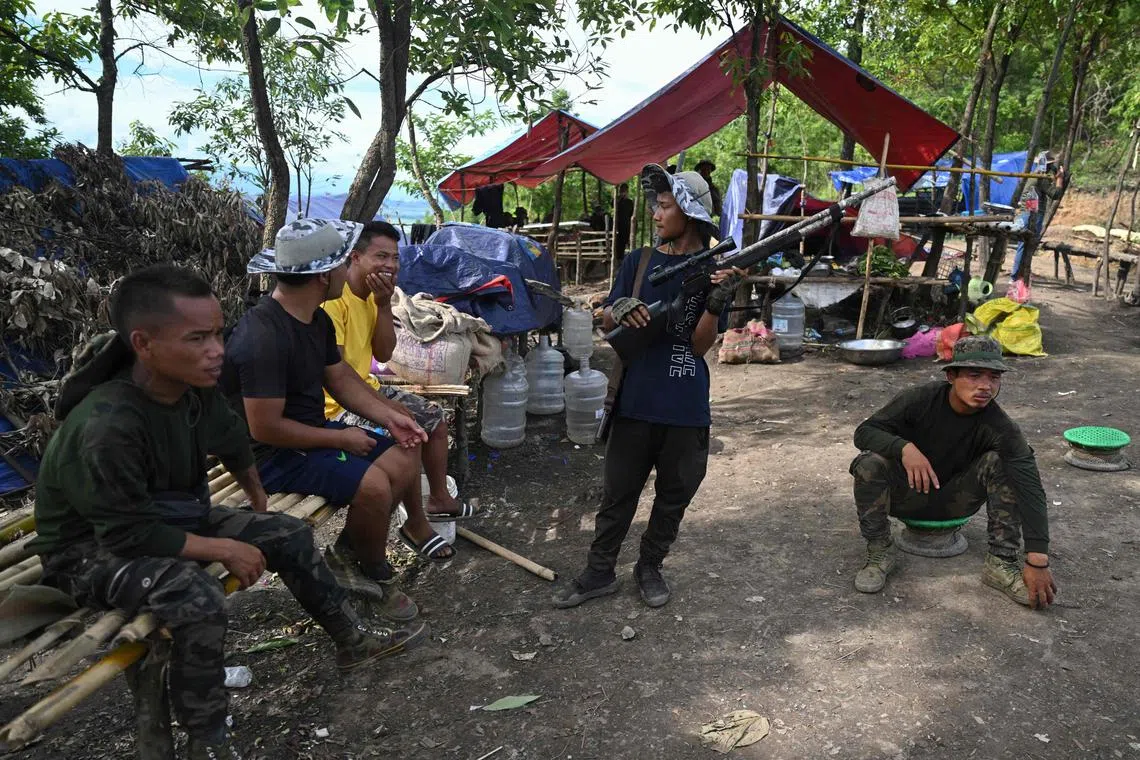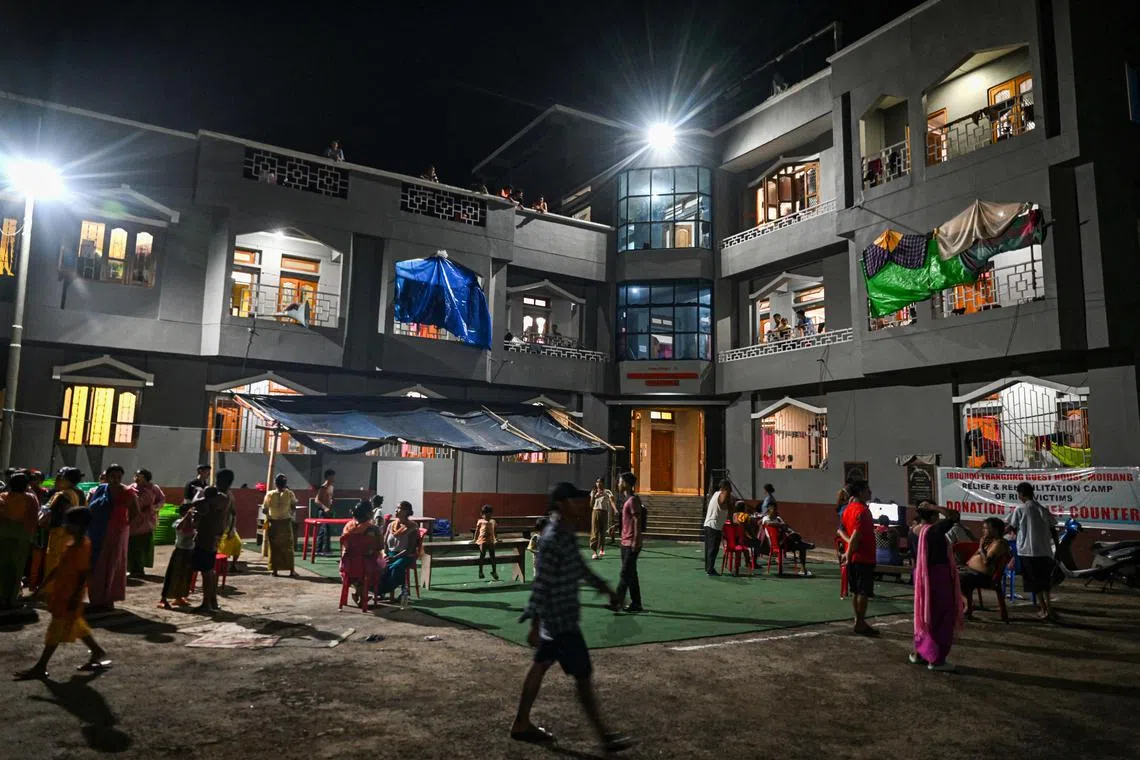Unrest in Myanmar linked to ongoing ethnic strife in India’s Manipur state
Sign up now: Get insights on Asia's fast-moving developments

Armed tribal volunteer combatants at a makeshift camp on July 24, amid ongoing ethnic violence in India's Manipur state.
PHOTO: AFP
NEW DELHI - Unrest in Myanmar since the coup in 2021
Majority Meitei and minority Kuki communities in Manipur have clashed with each other since early May,
While the immediate provocation was a proposed affirmative action policy favouring the Meiteis, the violence has brought to the fore the underlying tensions centred on demographic change, with the Meiteis even apprehensive about losing their majority status and influence in Manipur because of “large-scale illegal migration” from Myanmar.
The state shares a 398km border with the adjoining country.
Meitei outfits have accused the Kukis, who share strong ethnic linkages with Chin people across the border, of illegally settling Myanmar refugees in Manipur’s hills. Their rhetoric has even been exaggerated and provocative, with a representative from a prominent Meitei group recently claiming that “the majority of Kukis are illegal”.
The Meitei community, who make up a little more than half of the state’s 3.2 million population, is mostly confined to around 10 per cent of Manipur’s area in the valley districts. The remaining population – mostly from the tribal Kuki and Naga communities – inhabit the hilly terrain that covers 90 per cent of the state.
Manipur’s Chief Minister and Bharatiya Janata Party leader N. Biren Singh, a Meitei, has blamed illegal migrants and drug lords from Myanmar for the lingering violence, claiming such forces were trying to “destabilise the state”.
Last week, India’s Solicitor-General Tushar Mehta even told the Supreme Court that most of the 118 bodies lying unclaimed in Manipur’s morgues are those of “infiltrators who came with a particular design and got killed”.
Responding to the concern over illegal migrants, the authorities in Manipur began collecting biometric details of Myanmar nationals in the state on July 29 to ascertain their numbers and keep tabs on them.
As recently as July 22 and July 23, 718 Myanmar nationals had crossed over into Manipur because of ongoing clashes in Khampat in western Myanmar.
The 1,643km India-Myanmar frontier is an open border with a free movement regime, permitting tribes residing on both sides of the border to travel up to 16km across the boundary for up to three days without visa restrictions. This regime was suspended in 2021, but that has failed to check the inflow of Myanmar nationals into India.
A senior Manipur state government official, who did not wish to be identified, told The Straits Times that the collection of biometric details is an effort to ensure that such migrants “do not become Indian citizens by unlawful means even if they stay here for some time due to various reasons”.
He said about 2,500 Myanmar nationals had been identified in the state in a prior exercise this year, adding that the number of such migrants in Manipur was “uncertain”. Civil society organisations estimate this figure could be anywhere between 15,000 and 20,000.
But with no accurate numbers of illegal Myanmar migrants, the Meitei narrative of “large-scale illegal immigration” has been dismissed by Kuki groups as a “broad-brush” attack that seeks to taint the entire community of Kuki Indians and further inflame tensions.
Mr Thangminlen Kipgen, spokesman for Kuki Inpi, an organisation that represents the community’s interests, welcomed the move to track illegal migrants in Manipur.
“Once and for all, the truth should come out on illegal migrants across all community lines. This way, at least the false narrative against Kukis can stop and we can start acting on what to do with illegal immigrants,” he told ST.
While maintaining that refugees in the state who have fled persecution in Myanmar need to be offered temporary identity documents and humanitarian support, Mr Babloo Loitongbam, director of Human Rights Alert, an organisation based in Manipur’s capital Imphal, said that concerns around continued illegal migration across the unregulated border and the associated demographic change had to be addressed sincerely as well.
“We, as members of the civil society, have been asking for a population commission to understand this issue properly and formulate proper recommendations. Otherwise, this totally open border where people can move around without any regulation – if this continues for too long, it is going to be very dangerous in the long run.”
Another issue under the spotlight because of the ongoing strife is widespread poppy cultivation in Manipur’s hills, especially by Kukis under the watch of local militant groups, and how this trade connects to the wider “Golden Triangle” region of South-east Asia, which includes Myanmar and harbours a thriving opium economy.
Concern over the issue has sustained Meitei protests against “Chin-Kuki narco-terrorism”. The Manipur government had launched a “war on drugs” in 2018 to root out poppy cultivation, but Kukis have claimed that it has since become a way to uproot their community, in which many have taken to cultivating poppy in the absence of other viable opportunities.
Mr Kipgen said he would “blame the state government for encouraging poppy cultivation in the hills”, because of its failure to provide necessary support and infrastructure to make non-poppy farming lucrative for locals. A lack of food processing centres, transport subsidies and cold storage facilities, which Kukis have long demanded, has made regular vegetable farming unviable, he added.
“As a result, Kukis, Nagas and Nepalis in the hilly areas have resorted to cultivating poppy because it is economically viable for them. It has become the source (paying for) education for their children and a steady source of income.”

A relief camp for the displaced Meitei community in Manipur’s Moirang town.
PHOTO: AFP
Mr Loitongbam said ascribing blame for the drug trade in the state to one particular ethnic group or just the farmers who are at the bottom of a “well-oiled trans-border drug network”, comprising politicians, militant groups and drug lords, is a “very wrong analysis”.
“This is done deliberately so that the accountability of the big fish can be swept under the carpet... I am sure there are big Kukis involved, but there are definitely key position holders in the Manipur government who are Meiteis and are also involved in it,” he added.
India’s border with Myanmar has gained attention for the wrong reasons, including insurgency as well as illicit trade of drugs and weapons.
The government has begun fencing the border with Myanmar in Manipur, but Dr Anuradha Oinam, a research scholar with the Centre for Land Warfare Studies in New Delhi, told ST that neither the border’s complete fencing nor a complete withdrawal of the free movement regime is the “best available option”, given strong people-to-people links in the region.
Instead, she recommends formalising trade along the border, including by developing infrastructure at the “dysfunctional” land Custom stations, and creating designated entry and exit points that will help manage the border areas effectively.
“What is needed is for New Delhi to tackle the issue by pursuing a ‘killing the snake without breaking the stick’ approach,” Dr Oinam added.



